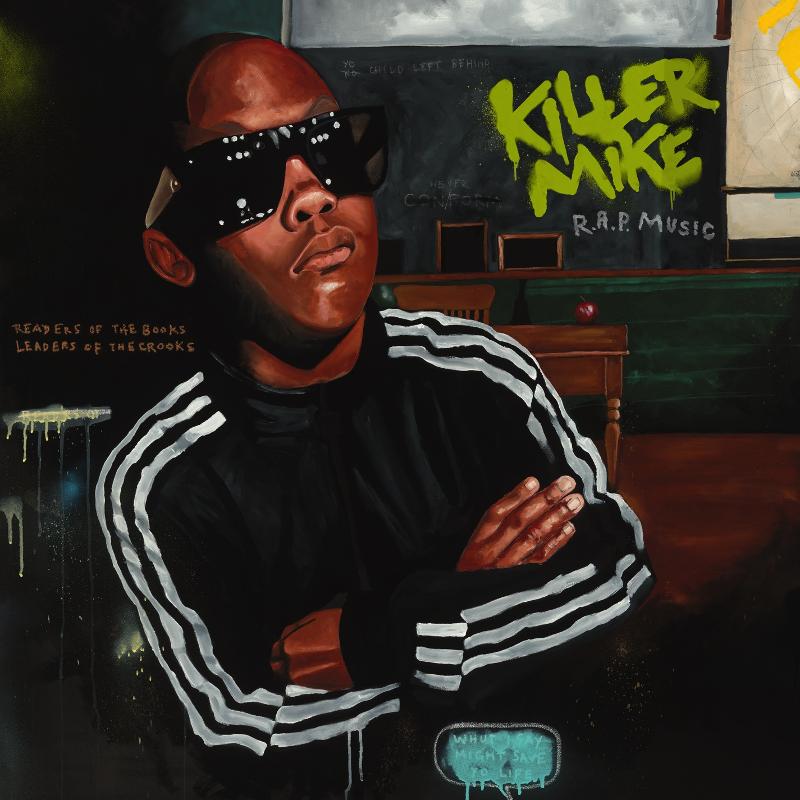The title of Killer Mike’s latest album is R.A.P. Music which is a pretty simple title, all things considered. It’s also deceptive, because there is a lot going on in this record. In interviews and press, Mike has made a point of letting everyone who will listen know that he felt like this record was the instant classic that his oeuvre had previously been missing. That’s a lot to live up to for a dude who has six albums, four mixtapes, “A.D.I.D.A.S.”, and a few Outkast classics to his name. But R.A.P. Music is exactly what Mike has been proclaiming. It travels through Mike’s myriad concerns, from standard hip-hop fare like the quality of modern rap music, to the social issues of the country that are surely hightened in Mike’s hometown of Atlanta, to the failures of governments both Democratic and Republican to actually help people.
Let’s talk about El-Producto first. The former Definitive Jux label head produced all of R.A.P. Music after, according to Mike, the rapper hassled El-P for days to do more than a handful of tracks until El-P relented. This, it must be said, was a good decision. The sawtoothed maximalism that’s colored every one of Producto’s releases since The Cold Vein is perfectly suited for Killer Mike’s violent and vibrant bark, a fact that’s apparent from the opening moments of lead track “Big Beast.” For eight bars, a syncopated slap is all that accompanies Mike, but the Atlanta rapper spits with such force that it implies the track’s later explosions of overblown bass, machine gun snares, and nuclear toms. Or “Southern Fried,” which filters the lazy drawl of Big K.R.I.T.’s productions through a slippery, pitch-shifted alternate reality where Alabama exists on the moon.
And Killer Mike’s sprawling material stretches El-P’s own color choices, especially on the record’s second half. Songs like “Ghetto Gospel,” “Anywhere But Here,” “Willie Burke Sherwood,” and the epic closing title track all feature many El-Producto staples — an array of alien abduction synth tones, aggressive scorched earth percussion, winding song structures — but bits of gospel, R&B, soul, jazz, psych, and general melancholia pull at the edges of the typical El-P canvas. The result is something truly collaborative, something that feels as though it could only exist with these two particular relentless perfectionists.
And Mike is a perfectionist, make no mistake. Just as his emotional material forces El-P to add different genre ingredients into his cooking pot, the multitude of different attack vectors that El-P features on R.A.P. Music encourage Mike to rock a variety of flows, from the double- and triple-timed raps on the two minute Twista challenge of “Go!” to the laser-focused, laconic edge of the ultra-political “Reagan.” Both of those songs, and really everything here, showcase Mike locked into his beats with uncanny, preternatural skill. Where showier rappers might want to rush on “Reagan” or less confident rappers might let the beat overwhelm them on “Go!”, Mike’s relationship with El-P’s beats is symbiotic.
And then there are Mike’s lyrics. On R.A.P. Music Mike’s furious, indignant, but also incisive invective serves to position him as the Almighty Hand of God. He seems to speak from a position of above-ness, looking down on a world he no longer understands with an analytical eye, so he can communicate absolute authority whether he’s diving into the ghetto minutiae of “JoJo’s Chillin” or taking on a topic as broad as the government corruption of the last twenty-five years. And there are plenty of other moments that are imbued with certainty due to Mike’s powerful delivery. On “Willie Burke Sherwood,” Mike makes reading books sound like the most bad ass activity anyone could participate in, dropping lines about Lord of the Flies characters with confidence. And on “Southern Fried” he positions strip clubs as a place he can express marital fidelity, as Mike tells a stripper trying to grind up on him that he and his wife are on “That Bun and Pimp shit/ See we is a duo,” before telling the girl off with simply “We don’t need no new ho.”
This means that R.A.P. Music sounds important, in a big picture way, long before Mike evne starts spitting about important shit. The way El-P and Mike blend their sounds together is on some high-end cooking shit, each willing to step into the other’s world just enough where both are stretched beyond their comfort zone. The resulting album is one that is deceptively simple, a send-up to the aggressive cultural awareness of old-school rap on the surface, filtered through a hundred different post-apocalyptic scenarios, musical and lyrical. It’s a reflection of its title, R.A.P. Music; the R.A.P. actually stands for Rebellious African People, a thought made more provoking and inclusive when you consider that human history began in Africa, and that Mike surely knows that fact.


